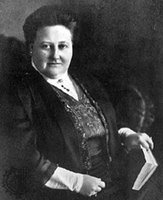 In her first book of poems, A Dome of Many-Coloured Glass, American poet Amy Lowell includes a lengthy ode to books and intellect called The Boston Athenaeum. The poem serves to depict her comfort with reading, with exercising the mind, showing an almost connubial joy related to interludes in the library. But more than that, running throughout The Boston Athenaeum is worship of old thought, a reverence for the past and what seems an unquestioning acceptance of the beliefs which structured the books of these ancestors.
In her first book of poems, A Dome of Many-Coloured Glass, American poet Amy Lowell includes a lengthy ode to books and intellect called The Boston Athenaeum. The poem serves to depict her comfort with reading, with exercising the mind, showing an almost connubial joy related to interludes in the library. But more than that, running throughout The Boston Athenaeum is worship of old thought, a reverence for the past and what seems an unquestioning acceptance of the beliefs which structured the books of these ancestors.Lowell weaves her verse across time, finding some invisible affiliation with these dusty books and the minds that birthed them. Her treatment is a suffocating elitism of intellect. Line after line establishes the voice of the aristocrat, separating readers into those connected and those who are not.
Lowell begins this journey of separation with a little paean to books and their rightful readers:
So books give up the all of what they mean
only in a congenial atmosphere,
only when touched by reverent hands, and read
by those who love and feel as well as think.
For books are more than books, they are the life,
the very heart and core of ages past.
As she explores the old library, its dusty floor, winding up the spiral staircase into its nooks and crannies, she effuses over its riches, its hypnotic wonder. Then come the references to rightful inheritance and racial possessiveness, calling up quickly the memory of her older brother, Lawrence Lowell, the longtime Harvard president known for his public and private bigotry toward Jews, homosexuals and African Americans.
The dear, old, sleepy place is full of spells
for us, by right of long inheritance.
The building simply bodies forth a thought
peculiarly inherent to the race,
and we , descendants of that elder time,
have learnt to love the very form in which
the thought has been embodied to our years.
I'm more convinced now that the discomfort of William Carlos Williams with what became the Imagist movement was due to the inherent racism of its "members," including Lowell and Pound. What's ironic of course, is that Amy Lowell was a lesbian, another one of those abused groups lumped under the umbrella of unacceptability to the cadre from which Imagism bloomed.
But returning to that Boston that birthed her and influenced her, she continues on in her blatant espousal of racial tendencies, perhaps finely depicted but nevertheless present.
We too are one with our own richest past;
and here that veiled but ever smoldering fire
of race, which rarely seen yet never dies,
springs up afresh and warms us with its heat.
Lowell sounds a call of caution mixed with final awe as she concludes this poem, reminding readers of the value of the old library and its antiquarian treasures:
For what to us were halls and corridors
however large and fitting, if we part
with this which is our birthright; if we lose
a sentiment profound, unsoundable
which Time's slow ripening alone can make,
and man's blind foolishness so quickly mar.
Perhaps she's calling for a preservation of the library and its collections. Perhaps she's calling for a preservation of the thoughts and attitude that wend through generations and deem one group, one race the elect, and all others less than worthy?
What do you think?

No comments:
Post a Comment